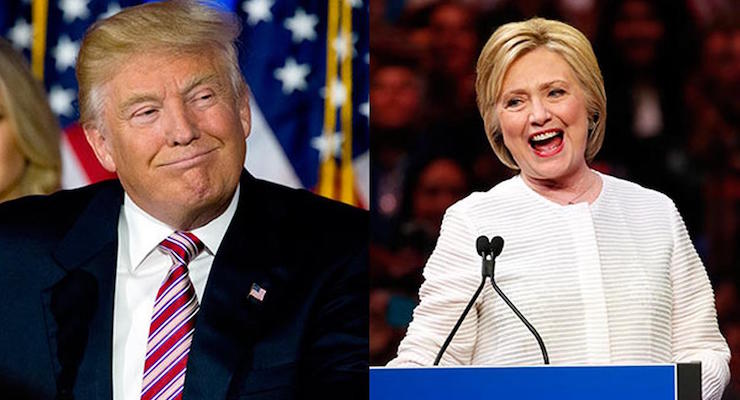

Presumptive nominees Donald J. Trump, left, and Hillary R. Clinton, right, give victory speeches on Tuesday, June 7, 2016, in New York. (Photos: AP)
What if the most remarkable aspect of this presidential election is not how much the two principal candidates disagree with each other but how much they actually agree?
What if they are both statists? What if they both believe that the government’s first duty is to take care of itself? What if they both believe in the primacy of the state over the individual? What if, in clashes between the state and individuals, they both would use the power of the state to trample the rights of individuals?
What if the first priority of both is not to decrease the size and scope of government but to expand it? What if they both believe that the federal government may lawfully and constitutionally right any wrong, tax any behavior and regulate any event? What if they both want to add a few thousand new employees to the federal payroll, give them badges and guns and black shirts, and engage them as federal police to insulate the federal government further from the people and the states?
What if, when James Madison wrote the Constitution, he took great pains to reserve powers to the people and the states that were not delegated away to the feds? What if both Hillary Clinton and Donald Trump couldn’t care less about that?
What if both of them reject the Madisonian principle that the federal government is limited in scope to the 16 unique and discrete powers given to it by the Constitution? What if they even reject the corollary to that principle, which is that the balance of governmental powers — those not delegated by the Constitution to the feds — resides in the states? What if they both reject the Madisonian principle that in areas of governmental power retained by the states, the states should be free from federal interference?
What if this principle of a limited federal government depends upon the principle of natural rights — areas of human behavior and choice stemming from our humanity and immune from government interference? What if the Declaration of Independence and the Ninth Amendment to the Constitution define our natural rights as inalienable? What if both Trump and Clinton reject that? What if she believes in killing innocents by drone and he believes in torturing innocents at Gitmo?
What if both Clinton and Trump accept the principle that the federal government can address any problem for which there is a national political consensus? What if this idea — championed by Woodrow Wilson, who hated the values of Madison — is the opposite of what the Framers wrote and intended?
What if this Wilsonian principle has unleashed the federal government to regulate nearly all aspects of personal behavior and to enhance immeasurably the powers of an unelected, unseen and unaccountable federal bureaucracy, which never seems to shrink or change?
What if both Trump and Clinton embrace the idea that federal power, rather than being limited by the Constitution, is limited only by what the feds can’t get away with politically? What if this concept was expressly rejected by the Framers but both Trump and Clinton don’t care? What if neither of them believes that a limited federal government must reside and remain within the confines of the Constitution?
What if Trump wants the police to be able to stop anyone they wish based on just a hunch that the person is armed or possessing contraband? What if the Fourth Amendment — which requires the police to have individual articulable suspicion, not just hunches and not judgments based on race, in order to stop a person — was expressly written to prohibit just what Trump wants? What if Trump doesn’t care because he prefers votes to constitutional fidelity?
What if Clinton wants free higher education for all in America who go to community colleges, all of which are government-owned? What if the Constitution does not delegate regulatory or spending authority over education to the feds? What if there is no such thing as “free” college? What if someone somewhere will need to pay for it?
What if all federal revenue is already committed to wealth transfers (Medicare, Medicaid, Social Security, welfare), interest payments on the federal government’s debt (now north of $400 billion annually) and the Pentagon (which spends crazily so its budget won’t be reduced in the future)? What if the Clinton “free” college deal would mean the feds would need to tax more or borrow more or both?
What if more taxation means less money for the productive aspects of society? What if more borrowing produces a decrease in the value of what you already own? What if a dollar spent by the feds produces far less wealth — jobs, income, productivity — than a dollar invested in the private sector? What if Clinton doesn’t care because she prefers votes to economic productivity?
What if both Trump and Clinton believe they can use the federal government to bribe the poor with handouts, the middle class with tax breaks, the rich with bailouts and write-offs, and the states with block grants? What if Trump himself has benefited enormously from federal write-offs available only to the very rich?
What if neither talks about personal liberty in a free society? What if they both talk about the government’s duty to keep us safe? What if neither talks about the government’s first duty, which is to keep us free? What if neither believes that the government works for us? What if they both really believe that we work for the government?
What if Mark Twain was right when he said that the reason we get to vote is it doesn’t make much difference?






Tim Hosford / October 7, 2016
@Judgenap @PPDNews even if they do, it’s all about the SCOTUS appointments.
/